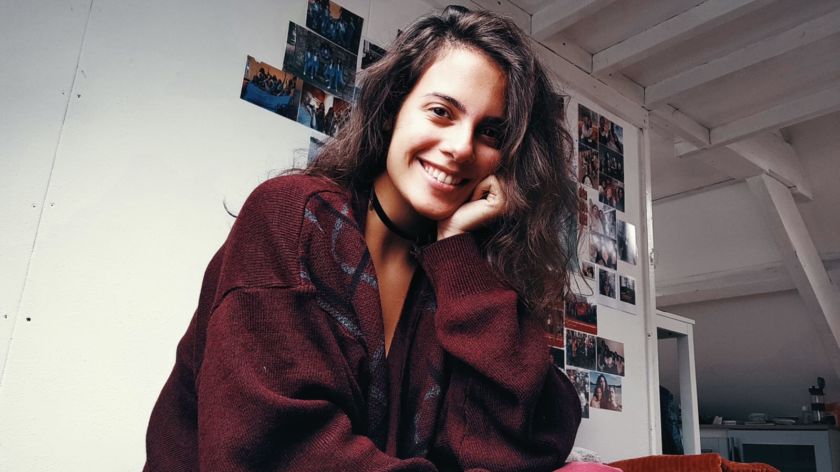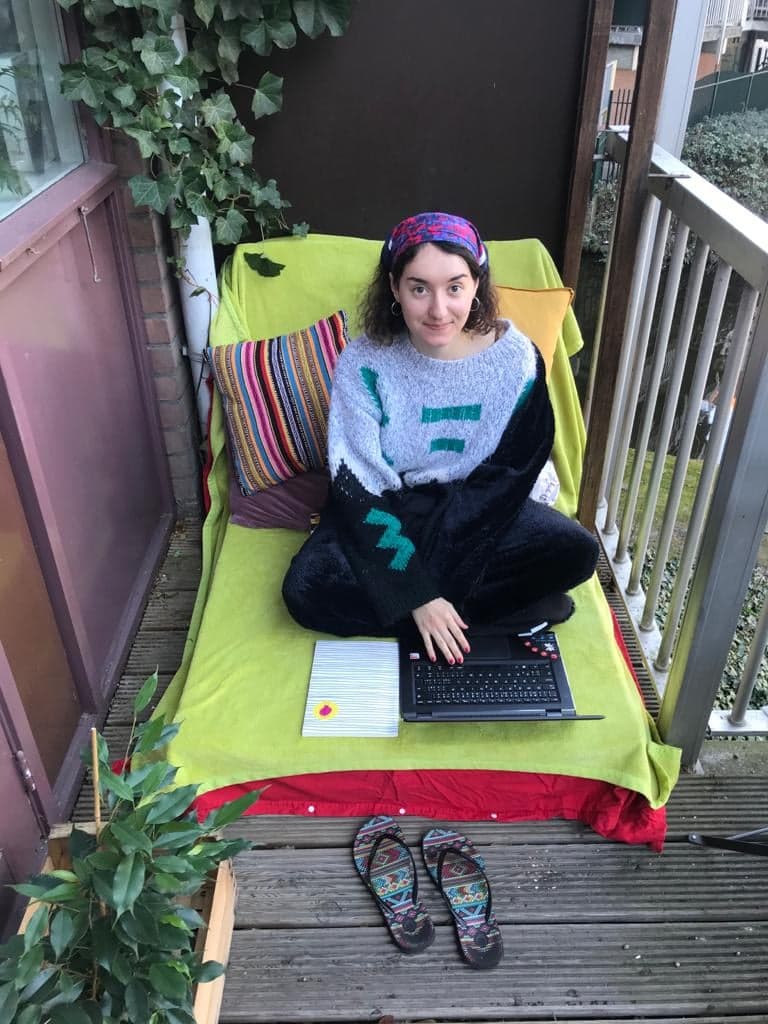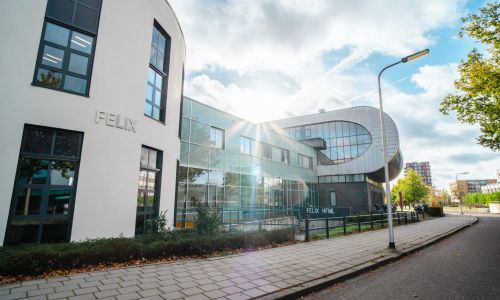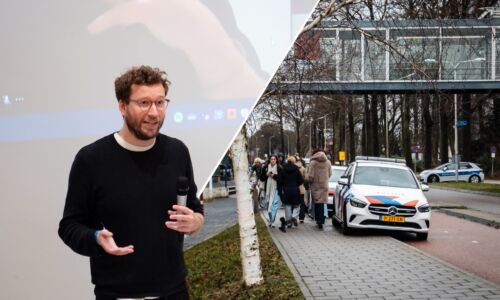International students on the past year: ‘We have lost the community we belonged to’
-
 Daniela Piangiolino
Daniela Piangiolino
After more than a year of corona, many countries are still in full or partial lockdown. Some international students are stuck in their rooms in the Netherlands, others miss contact with the university and their fellow students in their home country. Three students talk about their experiences. 'We underestimate the trauma this pandemic has caused.'
Daniela Piangiolino, Arts and Culture Studies, Italy
Third-year student Daniela is in Italy at the moment. She came back home for Christmas, but then all the flights got cancelled. Italy is still in a strict lock-down, thus people are not allowed to go to another region. Since there are no flights from Daniela’s city, she is ‘stuck since the middle of December’. She says she misses Nijmegen a lot and hopes to come back to the Netherlands in April if flights will not be cancelled again.
‘It is a good working environment here. However, it is hard to be motivated to study, because I do not have any people from my studies or people with the same passions and interests around me. Also, it is sometimes challenging, because we have different ‘cultural time zones.’ In the Netherlands, it is common to have meetings at 1 p.m. or 2 p.m., while in Italy it is common to have lunch (break) time at that time. At these hours you normally eat and spend time with your family. My mind is usually ready for meetings or studies after 3 p.m. – 4 p.m., but studying from distance does not always allow that. I can imagine that for the students with big time zone differences it must be really challenging to follow the studies.’
‘From September to December, I was still in the Netherlands. I lived in the house with other students, where we didn’t have any shared space, so we wouldn’t communicate. You are just alone in that room where you do everything: eat, rest, work, study. It can get suffocating. Sometimes this feeling comes back in Italy, as I still spend most of my time in one room, studying. Also, there is a lot of stress regarding mobility: ‘can I come back to the Netherlands?, and if I will come, will I be able to go back to Italy?’
‘Friendships are also affected by the pandemic. You don’t keep such close connections anymore, you have less to share, as you no longer create new memories together. You might not even meet the people whom you befriended during your studies anymore, as many of them left and might not come back; you lost chances to get to know your classmates whom you didn’t before the pandemic.’
‘I think Corona is also giving us a lot of opportunities. To meet virtually or even to rethink what and how we are doing. For example, our professors are great and very understanding, but the university is still giving a huge pressure on students and professors, asking to deliver everything on time. While I think we should stop and rethink this system. I think that mental health is not considered enough in our university. Instead of being just an institution of knowledge and research, it should also focus on helping its members to feel safe.’
Farijn Janssen, Arts and Culture studies, Curaçao
Farijn Janssen, from Curaçao, hasn’t seen her family for almost a year now. She managed to get home for some time last summer, as regulations were less strict in most of the countries, but then came back to the Netherlands for studying.
For most of the time she could have gone home, but travelling now is more confined. From 31 March 2021, Curaçao is in a full lockdown. ‘It was very difficult at the beginning, as none of us knew what was going to happen. It felt that all this life that I set for myself or built in a year, fell apart. You don’t have anyone here. Of course, you make friends along the way, but for example, many of them left due to Corona.’
Farijn also reflected on the events that Curaçao was facing in March-April of last year. ‘For a country, where 80% of the economy relies on tourism, the sudden stop was striking. Since Curaçao did not receive financial aid from the Netherlands, people were facing huge financial struggles, including my family members. At that moment, when I heard about the protests there, I felt like my home was set on fire and I could not do anything, just watch from afar.’
‘It was extremely hard during the Christmas time: I don’t have any friends from my home country here. I hesitated if to go home or not, but there was this fear ‘what if I get stuck?’, as the situation with transportation was very unstable at the time. When eventually I decided to go home, all of my family members got Corona. So, I stayed here. It was the first time I spent Christmas alone.’
‘It is hard as an international student at the moment. We are completely alienated. We lost the community we belonged to. I realised the difference of our social situation, in the company of my Dutch friends. They can go home to their parents and be taken care of, even for a little while, whilst we, internationals, are alone and don’t have any other place to go. It can get very lonely. There was a month in my life when I haven’t touched anyone. It is something that a person who never left home can never know and never have to feel.’
Farijn encourages Dutch students to be more conscious of their international friends, to check on how they are doing or to invite them for a walk, ‘most of us are completely alone here.’
‘We underestimate the amount of trauma that this thing caused us. Our lives transformed extremely, but in terms of expectations and meeting the deadlines on time, nothing has changed. We come to the classes where we all act as if nothing is going on; and because of all the pressure, sometimes you don’t even have the energy to take care of yourself. That should be taken into consideration more seriously.’
Martina Janičkova, Arts and Culture Studies, Slovakia
Third-year student Martina met her family twice this year. ‘I travelled back home for the first time in summer because at that time regulations were less strict. It has been half a year since I’ve seen my family.’
‘The situation was unstable in my country back then, regulations were changing all the time – there was no clarity. Nonetheless, I wanted to come back to the Netherlands, as I already had my life here; besides the conditions back home are not the best for studying.’
Martina remembers the local scepticism (including her own) when the pandemic reached us. ‘At that time in the Netherlands, everyone was carefree, while my country was already employing strict regulations. I remember I was just about to travel to Slovakia and precisely on the day of my flight, the Slovakian government decided to shut down all of the airports and cancel all of the flights. Then in about a week or two, the situation here also changed.’
‘At first, to be honest, it felt nice. I found joy in little things. The spring also escalated these feelings. On the other hand, it was hard to find a job as an international student in Nijmegen already before Corona, so after my work closed, I faced some real financial problems.
‘In autumn the mood was changing. Soon everything went fully online. I know that many of my classmates went back home. I wanted to be close to the university in case teaching on campus would start again. Of course, there were times when it was really hard to be apart from my family, but I was lucky enough to be surrounded by great people in Nijmegen with whom we were there for each other.’
‘During the winter, staying here got harder: it was more difficult to meet people, as the restrictions intensified. My introverted side thrived during this time, and with that, the feeling of alienation.’
‘As an international, you are already not part of the society you arrive in, but by meeting other internationals or simply working and just having social life going on, you develop a different sense of belonging. And now, it was shattered. I am neither in my country nor with the community that I established here. Being locked in your room enhances that feeling. Virtual communication compensates it to some extent (I talk to my sister every day, which also helps my mental health-being), but generally, you feel alienated from any community.’
‘I feel lucky that I was able to go home for Christmas, especially knowing that so many people could not meet with their families. It was a very emotional visit since we haven’t seen each other, again, for half a year. And even though I was physically apart from my family members for most of the time, our relationships got stronger during these times.’





